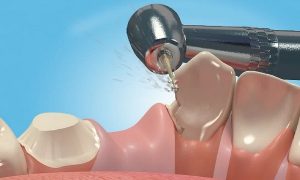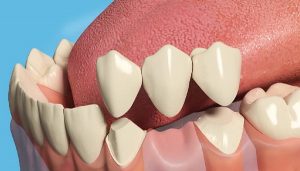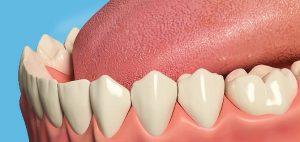Benefits
As well as restoring an incomplete smile, bridges can offer a host of other benefits, including:
- Improving how you eat and speak.
- Enhancing facial contours.
- Distributing the forces in your bite correctly.
- Preventing remaining teeth from moving out of position.
Treatment steps
- The abutment teeth are prepared by removing a layer of enamel to ensure there will be sufficient room for the crowns.
- Impressions are taken so the bridge can be tailor-made to fit.
- While the bridge is being made, a temporary bridge may be put in place to protect the exposed teeth.
- When ready, the bridge is checked and adjusted to make sure it fits perfectly and it is finally fixed in place with strong dental cement.
As well as traditional bridges, featuring crowns and a false tooth in between, there are also cantilever bridges, for cases where there are teeth on only one side of the gap, and Maryland bonded bridges, which are attached to existing teeth with metal or ceramic wings.
Aftercare
Good oral hygiene is essential to ensure the longevity of your bridge. It is especially important to clean under the false tooth, as well as brushing and flossing regularly.
If bridges are well looked after, and that includes keeping the surrounding teeth healthy so they can continue to provide a solid foundation, they should last for over ten years.
Why should I replace missing teeth?
Your appearance is one reason. Another is that the gap left by a missing tooth can mean greater strain on the teeth at either side. A gap can also mean your ‘bite’ is affected, because the teeth next to the space can lean into the gap and alter the way the upper and lower teeth bite together. This can then lead to food getting packed into the gap, which causes both decay and gum disease.
How are missing teeth replaced?
This depends on the number of teeth missing and on where they are in the mouth. The  condition of the other teeth also affects the decision.
condition of the other teeth also affects the decision.
There are two main two ways to replace the missing teeth. The first is with a removable false tooth or teeth – a partial denture. The second is with a fixed bridge. A bridge is usually used where there are fewer teeth to replace, or when the missing teeth are only on one side of the mouth.
Can I always have a bridge to replace missing teeth?
Yes, if you have enough strong teeth with good bone support. Your dentist will help you decide the best way of replacing your missing teeth within your budget.
What are bridges made of?
Bridges are usually made of a precious metal base. If the bridge will show, porcelain is then bonded to the base. Sometimes, there are other non-precious metals used in the base to reduce the cost.
Are bridges expensive?
Although a bridge may seem expensive it will last many years. It will also improve your appearance and bite. A bridge uses the considerable skill of the dentist and technician, and in this way, it’s similar to ordering a piece of hand-made jewellery. The materials are also expensive so it’s fair to say a bridge will not be the cheapest treatment you have ever had.
How do I look after my bridge?
You need to clean your bridge every day, to prevent problems such as bad breath and gum disease. You also have to clean under the false tooth every day. Your dentist or hygienist will show you how to use a bridge needle or special floss, as a normal toothbrush cannot reach
Are there other methods for fixing false teeth?
There are other methods, such as using a combination of crowns and partial dentures that can keep t he retaining clips out of sight.
he retaining clips out of sight.
These are quite specialised dentures, so you should ask your dentist about them. You can also have teeth implanted, ask your dentist for more information.
Remember that it’s as important to care for your remaining teeth as it is to replace the missing ones.
Are there different types of bridge?
Yes, there are different types of bridge which use different fixing method s. Your dentist will choose the most effective and conservative bridge for your personal situation.
s. Your dentist will choose the most effective and conservative bridge for your personal situation.
